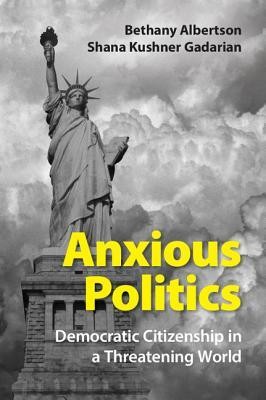How does anxiety created by political figures, the media and experts – collectively termed “elites” – influence the way that citizens engage with political ideas? What are the potential effects that this form of engagement may have on democracy and the provision of civil liberties? These are the questions central to the arguments posited in the book Anxious Politics. The authors Bethany Albertson and Shana Kushner Gadarian are American assistant professors and academic leaders in their fields of Political Science and Government. By bridging the gaps between academia and policy, the authors have developed a book that is both highly insightful and relevant in practice.
 The somewhat academic text is an amalgamation of literary interpretations, structured experiments, in-depth analysis and informed opinions. Using four substantive policy areas (public health, immigration, terrorism and climate change), the differences between framed and unframed threats are deliberated. Unframed threats are those that may cause immediate illness or physical harm, whereas framed threats are often temporally or personally detached, requiring further explanation or elite influence to be fully comprehended. There is also the potential for threats with immediate personal impact to become framed threats over time, if subject to persistent elite influence.
The somewhat academic text is an amalgamation of literary interpretations, structured experiments, in-depth analysis and informed opinions. Using four substantive policy areas (public health, immigration, terrorism and climate change), the differences between framed and unframed threats are deliberated. Unframed threats are those that may cause immediate illness or physical harm, whereas framed threats are often temporally or personally detached, requiring further explanation or elite influence to be fully comprehended. There is also the potential for threats with immediate personal impact to become framed threats over time, if subject to persistent elite influence.
The authors explain how anxiety produced by both framed and unframed threats can foster civic engagement and strengthen democracy by leading the public to seek out contemporary information, place their trust in political actors, and develop opinions or attitudes on current issues. This begins to paint a positive outlook for anxiety’s role in democracy, though further evidence explains that an anxious individual is more likely to diverge from partisan preferences or even offer support for policy solutions that are at odds with their self-interest. The eventual outcome is dependent upon which elites discuss the threats, how they try to frame them and where the public choose to place their trust.
In certain scenarios, the anxiety produced by framed threats can create misplaced trust in political figures or policies which are in turn framed as protective, yet are actually restrictive in nature, thereby supressing civil liberties in the name of protection. An example used is immigration – if it is effectively framed by political figures as a threat and detrimental to the economy, the public will be more receptive of policies that are subsequently framed as protective, regardless of the actual policy outcomes or the loss of civil liberties that minority groups may face due to their implementation. This manipulative agenda is heavily discussed throughout the book, with rigorous support of its influence across policy areas offered. Yet, even though this propensity is shown to exist, elite intentions are not portrayed as disingenuous or damaging democracy in all circumstances.
Although the political landscape assessed predominantly covers America’s developments over the 21st century, the policy areas discussed make the identified behavioral traits of high relevance to current global politics. For example, current European regimes and political hopefuls are framing issues such as migration and terrorism in ways that cultivate anxiety. Political figures then seek public support of strategically framed protective or protectionist policies, which segregate minorities or strip civil liberties in the name of security or economic benefit. Whilst this manipulative agenda may have a disastrous impact on democratic process if it is left unnoticed by the public and unhindered by rival elites. It may alternatively result in greater public awareness of key issues and foster civil participation in governance processes if opposing elites offer a resolute alternative that is readily available and acceptable to the anxious public seeking safety and economic inclusion.
The parallels to Europe’s current condition are extensive and this book sheds light on the mechanisms of influence available to political figures, the media and experts, as well as the psychological responses that these influences may trigger in the public. Its scientific nature makes its content appropriate for real world application and its insights are useful across multiple policy fields and various political regimes. Anxious Politics is a valuable addition to the political science literature and a must read for those hoping to obstruct the manipulation of an anxious public by elite figures towards an undemocratic outcome that results in a widespread restriction of civil liberties.



